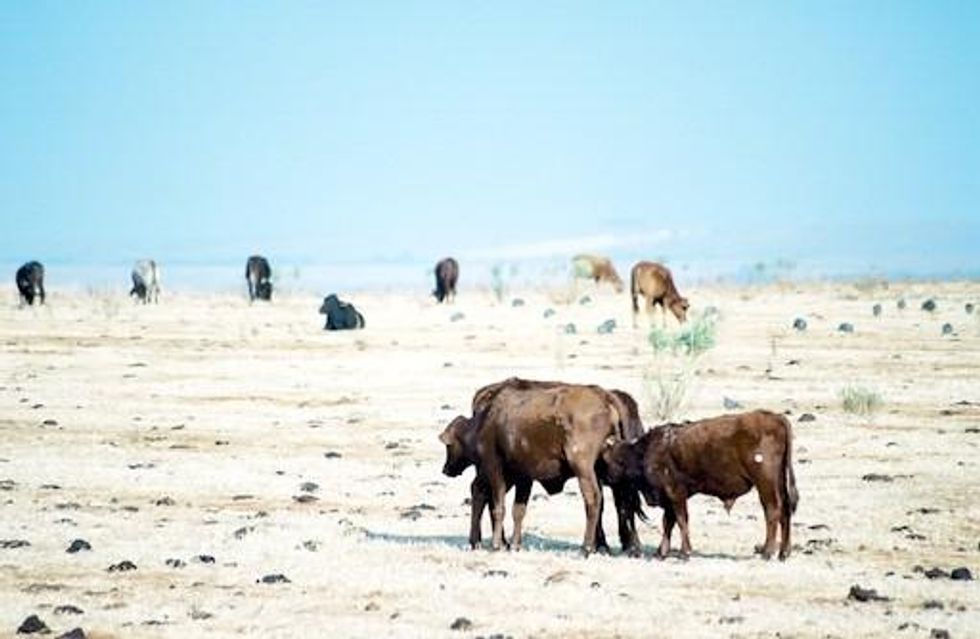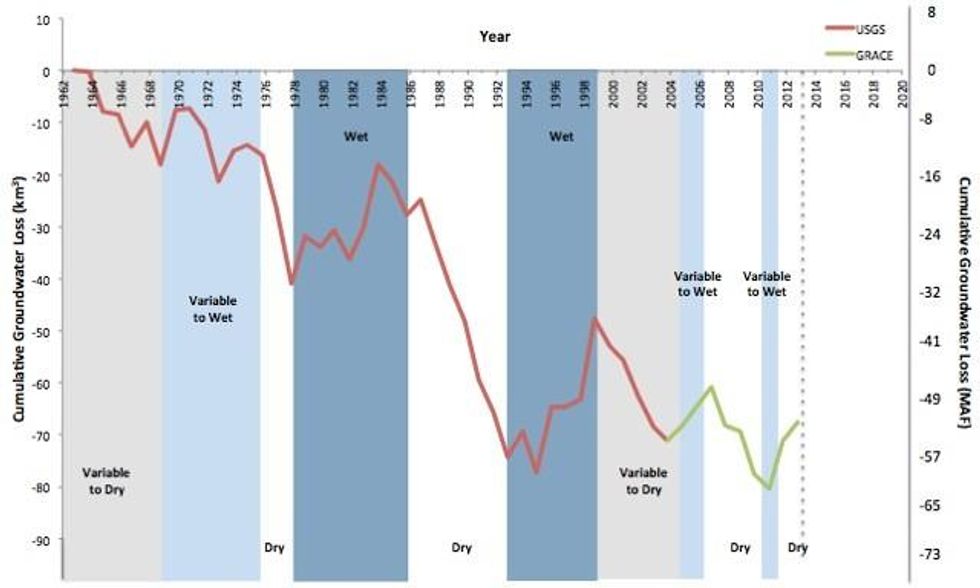Catastrophe Looming? 'Mega-Drought' Panic Sweeps California
Amid historic drought, farmers in nation's largest food-producing state pushed to unsustainable tapping of groundwater reserves

"California is losing water reserves as if through a sieve," reports Circle of Blue, a water resources news site.
According to satellite data published Monday, the state has been unsustainably "guzzling" key groundwater reserves in the farming region in the Central Valley.
Analysis of NASA satellite data by researchers at the UC Center for Hydrologic Modeling reveals that "from when the current drought began in November 2011 through November 2013, the amount of water stored in the Sacramento-San Joaquin watershed, the state's largest, and in the Central Valley has dropped by 20 billion cubic meters (5.3 trillion gallons)."
Further, almost no rain or snow has fallen during the 2013-14 wet season, leaving snow pack at just 12 percent of normal levels, which Circle of Blue reports, means "there is little snow in the mountains to replenish depleted reservoirs during the spring melt."
Reacting to the news of the state's groundwater lows, 350.org founder Bill McKibben tweeted, "this is really bad news."
"It's scary," Anthony Willcutt, resident of the Brooktrails Township--one of the 17 communities officials estimate will run out of water in 100 days or less--told USA Today.
Further taxing groundwater resources, on Jan. 31, the state Water Resources Department announced that it was not allocating any water from the Sacramento-San Joaquin River Delta to 29 local water agencies serving 25 million people--the first time in state history--and was slashing deliveries to agricultural districts by half.
The LA Times reports that without these allocations, ranchers and farmers in the state are being pushed to tap groundwater resources "whose quality is rapidly deteriorating from overuse and a lack of rainfall to replenish them."
Further, the lack of water is forcing many to "liquidate herds" and leave hundreds of thousands of farmland acres fallow.
As USA Today reported Wednesday:
A foreboding is seeping across the state as Californians gaze on rain-starved reservoirs, parched pastures and arid orchards at the start of what could be the worst year of drought since the mid-1970s. Most at risk is the Golden State's $45 billion-a-year agriculture industry, producer of nearly half of U.S.-grown fruits, nuts and vegetables. Farmers plan to plant fewer acres and some farmworkers are leaving for greener fields. Other financial effects are piling up. Ranchers are thinning cattle herds. Ski resorts have laid off workers. The state's Forestry Department says forest fire calls were up sixfold last month from past Januarys.
Governor Jerry Brown warned last week that this spell may amount to one of history's great "mega-droughts."
"It's a borderline catastrophe," Ryan Jacobsen, chief executive of the Fresno County Farm Bureau, told the LA Times. "The impact is going to be very traumatic."
The U.S. Drought Monitor reported last week that 'exceptional drought'--the most severe category--now covered 9 percent of the state.

_____________________
An Urgent Message From Our Co-Founder
Dear Common Dreams reader, The U.S. is on a fast track to authoritarianism like nothing I've ever seen. Meanwhile, corporate news outlets are utterly capitulating to Trump, twisting their coverage to avoid drawing his ire while lining up to stuff cash in his pockets. That's why I believe that Common Dreams is doing the best and most consequential reporting that we've ever done. Our small but mighty team is a progressive reporting powerhouse, covering the news every day that the corporate media never will. Our mission has always been simple: To inform. To inspire. And to ignite change for the common good. Now here's the key piece that I want all our readers to understand: None of this would be possible without your financial support. That's not just some fundraising cliche. It's the absolute and literal truth. We don't accept corporate advertising and never will. We don't have a paywall because we don't think people should be blocked from critical news based on their ability to pay. Everything we do is funded by the donations of readers like you. Will you donate now to help power the nonprofit, independent reporting of Common Dreams? Thank you for being a vital member of our community. Together, we can keep independent journalism alive when it’s needed most. - Craig Brown, Co-founder |

"California is losing water reserves as if through a sieve," reports Circle of Blue, a water resources news site.
According to satellite data published Monday, the state has been unsustainably "guzzling" key groundwater reserves in the farming region in the Central Valley.
Analysis of NASA satellite data by researchers at the UC Center for Hydrologic Modeling reveals that "from when the current drought began in November 2011 through November 2013, the amount of water stored in the Sacramento-San Joaquin watershed, the state's largest, and in the Central Valley has dropped by 20 billion cubic meters (5.3 trillion gallons)."
Further, almost no rain or snow has fallen during the 2013-14 wet season, leaving snow pack at just 12 percent of normal levels, which Circle of Blue reports, means "there is little snow in the mountains to replenish depleted reservoirs during the spring melt."
Reacting to the news of the state's groundwater lows, 350.org founder Bill McKibben tweeted, "this is really bad news."
"It's scary," Anthony Willcutt, resident of the Brooktrails Township--one of the 17 communities officials estimate will run out of water in 100 days or less--told USA Today.
Further taxing groundwater resources, on Jan. 31, the state Water Resources Department announced that it was not allocating any water from the Sacramento-San Joaquin River Delta to 29 local water agencies serving 25 million people--the first time in state history--and was slashing deliveries to agricultural districts by half.
The LA Times reports that without these allocations, ranchers and farmers in the state are being pushed to tap groundwater resources "whose quality is rapidly deteriorating from overuse and a lack of rainfall to replenish them."
Further, the lack of water is forcing many to "liquidate herds" and leave hundreds of thousands of farmland acres fallow.
As USA Today reported Wednesday:
A foreboding is seeping across the state as Californians gaze on rain-starved reservoirs, parched pastures and arid orchards at the start of what could be the worst year of drought since the mid-1970s. Most at risk is the Golden State's $45 billion-a-year agriculture industry, producer of nearly half of U.S.-grown fruits, nuts and vegetables. Farmers plan to plant fewer acres and some farmworkers are leaving for greener fields. Other financial effects are piling up. Ranchers are thinning cattle herds. Ski resorts have laid off workers. The state's Forestry Department says forest fire calls were up sixfold last month from past Januarys.
Governor Jerry Brown warned last week that this spell may amount to one of history's great "mega-droughts."
"It's a borderline catastrophe," Ryan Jacobsen, chief executive of the Fresno County Farm Bureau, told the LA Times. "The impact is going to be very traumatic."
The U.S. Drought Monitor reported last week that 'exceptional drought'--the most severe category--now covered 9 percent of the state.

_____________________

"California is losing water reserves as if through a sieve," reports Circle of Blue, a water resources news site.
According to satellite data published Monday, the state has been unsustainably "guzzling" key groundwater reserves in the farming region in the Central Valley.
Analysis of NASA satellite data by researchers at the UC Center for Hydrologic Modeling reveals that "from when the current drought began in November 2011 through November 2013, the amount of water stored in the Sacramento-San Joaquin watershed, the state's largest, and in the Central Valley has dropped by 20 billion cubic meters (5.3 trillion gallons)."
Further, almost no rain or snow has fallen during the 2013-14 wet season, leaving snow pack at just 12 percent of normal levels, which Circle of Blue reports, means "there is little snow in the mountains to replenish depleted reservoirs during the spring melt."
Reacting to the news of the state's groundwater lows, 350.org founder Bill McKibben tweeted, "this is really bad news."
"It's scary," Anthony Willcutt, resident of the Brooktrails Township--one of the 17 communities officials estimate will run out of water in 100 days or less--told USA Today.
Further taxing groundwater resources, on Jan. 31, the state Water Resources Department announced that it was not allocating any water from the Sacramento-San Joaquin River Delta to 29 local water agencies serving 25 million people--the first time in state history--and was slashing deliveries to agricultural districts by half.
The LA Times reports that without these allocations, ranchers and farmers in the state are being pushed to tap groundwater resources "whose quality is rapidly deteriorating from overuse and a lack of rainfall to replenish them."
Further, the lack of water is forcing many to "liquidate herds" and leave hundreds of thousands of farmland acres fallow.
As USA Today reported Wednesday:
A foreboding is seeping across the state as Californians gaze on rain-starved reservoirs, parched pastures and arid orchards at the start of what could be the worst year of drought since the mid-1970s. Most at risk is the Golden State's $45 billion-a-year agriculture industry, producer of nearly half of U.S.-grown fruits, nuts and vegetables. Farmers plan to plant fewer acres and some farmworkers are leaving for greener fields. Other financial effects are piling up. Ranchers are thinning cattle herds. Ski resorts have laid off workers. The state's Forestry Department says forest fire calls were up sixfold last month from past Januarys.
Governor Jerry Brown warned last week that this spell may amount to one of history's great "mega-droughts."
"It's a borderline catastrophe," Ryan Jacobsen, chief executive of the Fresno County Farm Bureau, told the LA Times. "The impact is going to be very traumatic."
The U.S. Drought Monitor reported last week that 'exceptional drought'--the most severe category--now covered 9 percent of the state.

_____________________

